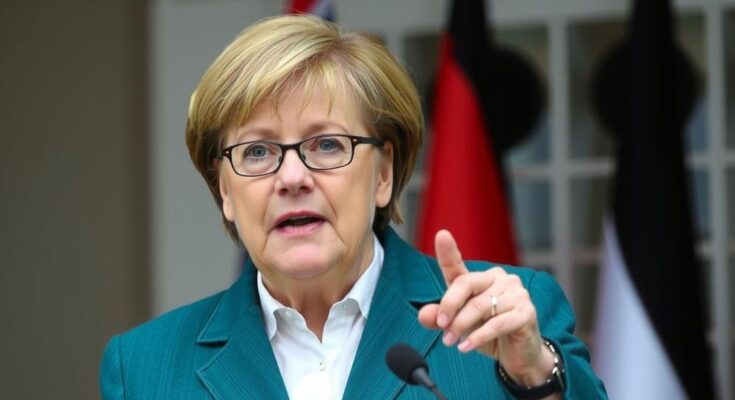German President Frank-Walter Steinmeier has dissolved parliament and called for national elections on February 23, 2025, following the collapse of Chancellor Olaf Scholz’s coalition government. Scholz leads a minority government after losing a confidence vote, with polls indicating decreased support for his party. The election will tackle key issues such as immigration and economic revitalization, while the right-wing AfD party also presents a candidacy amid complex coalition dynamics.
On December 27, 2024, Germany’s President Frank-Walter Steinmeier announced the dissolution of the Bundestag, prompting national elections to be held on February 23, 2025. This significant political move follows the recent collapse of Chancellor Olaf Scholz’s coalition government, which experienced turmoil culminating in a confidence vote loss on December 16. Following a contentious firing of his Finance Minister and ensuing disputes over economic revitalization, Mr. Scholz now leads a minority government, with party leaders rapidly converging to schedule the election seven months ahead of the original timeline.
The German constitution prohibits the Bundestag from self-dissolution, placing the decision squarely with President Steinmeier, who had a maximum of 21 days to act. Under the new timeline, the election must take place within the next 60 days. Preparations for the election are already in progress, with polls indicating that Chancellor Scholz’s party is lagging behind the conservative Union bloc, led by Friedrich Merz. It remains to be seen which coalition will secure power, with pressing issues such as immigration, economic recovery, and support for Ukraine at the forefront of the political agenda.
Alice Weidel of the anti-immigration party Alternative for Germany, which is enjoying strong polling support, has been nominated for chancellor. However, other parties are unlikely to collaborate with AfD, effectively barring it from governmental power. Germany’s complex electoral landscape typically results in coalition formations, and current polling data suggests no party is poised to achieve an outright majority. Following the elections, extensive negotiations will ensue as parties negotiate to establish a new government.
Historically, this marks only the fourth instance of early dissolution of the Bundestag in Germany’s post-World War II era, reflecting the volatile nature of its political climate. Past instances include decisions made during the tenures of Chancellors Willy Brandt, Helmut Kohl, and Gerhard Schroeder, the latter of whom successfully leveraged a confidence vote for an early election, resulting in a narrow victory for Angela Merkel’s center-right coalition.
The dissolution of the Bundestag and the ensuing call for early elections in Germany signal a significant political event shaped by ongoing instability within the nation’s governance. Chancellor Olaf Scholz, who recently lost his three-party coalition, now faces the challenge of steering his party through these trying times amidst unfavorable polling. The German political system, characterized by coalition governments, is currently experiencing a period of volatility, with multiple parties vying for power in an election that has now been scheduled much earlier than anticipated. The reasons behind the government’s collapse and the new election date arise from disputes surrounding economic policy and confidence levels within Parliament, reflective of broader issues concerning immigration and international relations.
In conclusion, Germany’s call for snap elections on February 23, 2025, represents a critical juncture in the nation’s political landscape. With the dissolution of the Bundestag, Chancellor Olaf Scholz confronts an uncertain future as he leads a minority government amid severe coalition challenges. The upcoming elections will not only determine the composition of future leadership but also address pivotal issues that are likely to impact Germany’s economic recovery and international stance. The situation remains dynamic, with significant implications for both the country’s governance and its role on the global stage.
Original Source: www.thehindu.com




